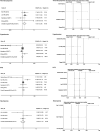Meta-Analysis of ABCG2 and ABCB1 Polymorphisms With Sunitinib-Induced Toxicity and Efficacy in Renal Cell Carcinoma
- PMID: 33762959
- PMCID: PMC7982400
- DOI: 10.3389/fphar.2021.641075
Meta-Analysis of ABCG2 and ABCB1 Polymorphisms With Sunitinib-Induced Toxicity and Efficacy in Renal Cell Carcinoma
Abstract
Background: ABCG2 and ABCB1 are genes related to the pharmacokinetics of sunitinib and have been associated with its toxicity and efficacy. However, the results have been controversial. This study aimed to evaluate the associations of ABCG2 and ABCB1 polymorphisms with sunitinib-induced toxicity and efficacy in renal cell carcinoma (RCC) by meta-analysis. Methods: PubMed, EMBASE, Cochrane Library, and Web of Science were systematically searched for studies investigating the associations of the ABCG2 rs2231142 polymorphism with sunitinib-induced toxicity and the associations of the ABCB1 rs1128503 and ABCB1 rs2032582 polymorphisms with sunitinib-induced toxicity and clinical outcomes. The associations were evaluated by effect size (ES) with 95% confidence intervals (CIs). Results: Eight and five studies were included in the toxicity and efficacy analysis, respectively, including a total of 1081 RCC patients. The ABCG2 rs2231142 A allele was associated with an increased risk of sunitinib-induced thrombocytopenia and hand-foot syndrome (HFS) in Asians (ES = 1.65, 95% CI = 1.15-2.36, p = 0.006; ES = 1.52, 95% CI = 1.02-2.27, p = 0.041). However, the ABCG2 rs2231142 polymorphism was not associated with sunitinib-induced hypertension or neutropenia (ES = 1.09, 95% CI = 0.69-1.73, p = 0.701; ES = 0.87, 95% CI = 0.57-1.31, p = 0.501). Compared with the C allele, the ABCB1 rs1128503 T allele was associated with a decreased risk of sunitinib-induced hypertension but worse progression-free survival (PFS) (ES = 0.44, 95% CI = 0.26-0.77, p = 0.004; ES = 1.36, 95% CI = 1.07-1.73, p = 0.011). There was no significant association between the T allele or C allele of ABCB1 rs1128503 and overall survival (OS) (ES = 0.82, 95% CI = 0.61-1.10, p = 0.184). The ABCB1 rs2032582 T allele was associated with worse PFS than the other alleles (ES = 1.46, 95% CI = 1.14-1.87, p = 0.003), while there was no significant association between the T allele or other alleles and sunitinib-induced hypertension, HFS, or OS (ES = 0.77, 95% CI = 0.46-1.29, p = 0.326; ES = 1.02, 95% CI = 0.65-1.62, p = 0.919; ES = 1.32, 95% CI = 0.85-2.05, p = 0.215). Conclusion: The results indicate that the ABCG2 rs2231142 polymorphism may serve as a predictor of sunitinib-induced thrombocytopenia and HFS in Asians, while the ABCB1 rs1128503 polymorphism may serve as a predictor of sunitinib-induced hypertension, and both the ABCB1 rs1128503 and rs2032582 polymorphisms may serve as predictors of PFS in RCC. These results suggest a possible application of individualized use of sunitinib according to the genetic background of patients.
Keywords: ABCB1; ABCG2; meta-analysis; polymorphism; renal cell carcinoma; sunitinib.
Copyright © 2021 Sun, Chen, Yao, Weng, Liu and Cheng.
Conflict of interest statement
The authors declare that the research was conducted in the absence of any commercial or financial relationships that could be construed as a potential conflict of interest.
Figures






References
-
- Atkins M. B., Gravis G., Drosik K., Demkow T., Tomczak P., Wong S. S., et al. (2015). Trebananib (AMG 386) in combination with sunitinib in patients with metastatic renal cell cancer: an open-label, multicenter, phase II study. J. Clin. Oncol. 33 (30), 3431–3438. 10.1200/JCO.2014.60.6012 - DOI - PubMed
-
- Beuselinck B., Lambrechts D., Van Brussel T., Wolter P., Cardinaels N., Joniau S., et al. (2014). Efflux pump ABCB1 single nucleotide polymorphisms and dose reductions in patients with metastatic renal cell carcinoma treated with sunitinib. Acta Oncol. 53 (10), 1413–1422. 10.3109/0284186x.2014.918276 - DOI - PubMed
-
- Cheng L., Wang Y., Li X., Feng W., Weng B., Yuan Q., et al. (2020). Meta-analysis of the associations of CYP2B6-516G>T polymorphisms with efavirenz-induced central nervous system side effects and virological outcome in HIV-infected adults. Pharmacogenomics J. 20 (2), 246–259. 10.1038/s41397-019-0112-2 - DOI - PubMed
LinkOut - more resources
Full Text Sources
Other Literature Sources

